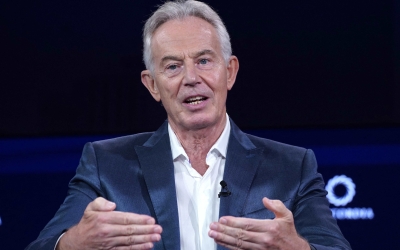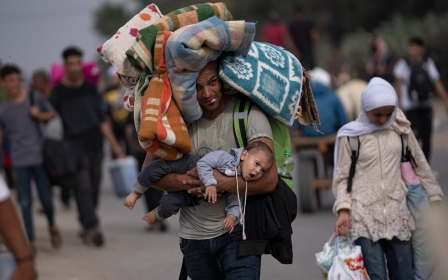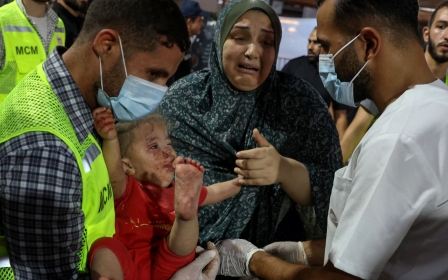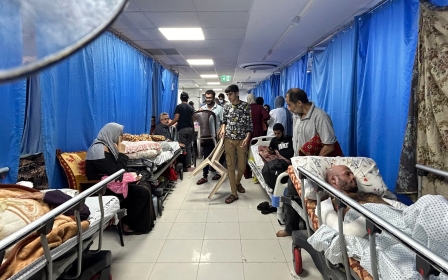Israel-Palestine war: Bodies pile up as Gaza's al-Shifa Hospital becomes a no-go zone

Corpses of Palestinians are piling up inside al-Shifa hospital in Gaza City with doctors electing to keep the bodies of the dead in its courtyard as anyone trying to bury them risks being shot by the Israeli army.
Eyewitnesses at the site painted an apocalyptic scene at the besieged Palestinian territory’s largest medical facility, which is besieged by Israeli forces who are not allowing anyone to move in or out of its buildings.
Palestinians say Israeli tanks, warplanes and snipers encircling the hospital have adopted a “shoot to kill” policy, which does not discriminate between medics, wounded Palestinians and those seeking refuge within the hospital's walls.
Mustafa Sarsour was one of the last remaining journalists at al-Shifa. He described doctors leaving the bodies on hospital grounds so that they would not decompose inside.
There is no power for refrigerators to store bodies and access to electricity is functionally non-existent.
New MEE newsletter: Jerusalem Dispatch
Sign up to get the latest insights and analysis on Israel-Palestine, alongside Turkey Unpacked and other MEE newsletters
He estimated there were 100 bodies, which have been left at the mercy of the elements and feral animals.
“Stray dogs and other animals bite at and eat the bodies,” he told Middle East Eye, adding that he and others at al-Shifa were powerless to intervene.
'We watch them eat but no one can move because Israeli snipers and quadcopters shoot at anyone who walks out of the hospital’s buildings'
- Mustafa Sarsour, journalist
“We watch them eat but no one can move because Israeli snipers and quadcopters shoot at anyone who walks out of the hospital’s buildings.”
He further described the horror of witnessing those inside the hospital seeing their relatives’ bodies desecrated.
In one case he recounts a woman watching the body of her brother being mauled by street dogs.
“The scene was horrible as she was watching, unable to move or do anything."
On 9 October, Israel imposed a full siege on Gaza and completely cut off its electricity, fuel supplies, water and food.
This means that power generators running hospitals, including al-Shifa, have completely shut down.
Follow Middle East Eye's live coverage for the latest on the Israel-Palestine war
In intensive care units, which rely on a continuous flow of electricity for incubators and other medical equipment to work, people are dying, including premature babies.
On Monday, Sarsour managed to get out of the hospital complex, joining a band of displaced people who were sheltering at al-Shifa.
Even then, the reality of death was ever-present. Despite there ostensibly being a safe corridor through the hospital, Israeli snipers continued to shoot.
"While we were walking, many people were shot dead although they did not do anything. They were just walking,” Sarsour said, adding: “I recorded a lot of footage proving that they were shot while peacefully crossing the safe corridor."
‘Total collapse’
A number of doctors, nurses and other medical professionals feel they have no choice but to remain at the hospital and stay with their patients until the end.
However, the staff are limited in the treatment they can offer to those in need.
Doctors are currently unable to give their patients the procedures they require due to a lack of resources. Even coordinating treatment between different departments is impossible as walking over to another building is a life-and-death matter.
In some cases, doctors have been stuck inside the hospital since the start of Israel’s assault, and are reaching the end of their mental limits.

"[The hospital] is totally surrounded by snipers and tanks. Drones are targeting whoever tries to move between the buildings of the hospital and within the hospital area," Dr Ahmed Mukhallalati, the chief of plastic surgery at al-Shifa, told MEE.
"We had many incidents where the wounded were in the adjoining block of the hospital, and they asked for help, and no one was able to reach the place,” he continued
“One of the members of the Alami family got injured. Her sister is a doctor here, and she tried to call an ambulance.
“No one was able to arrange for an ambulance to get there. She died waiting for help in the other block of the hospital.”
The stresses of war are causing a higher rate of miscarriages and premature births among pregnant women in Gaza.
Mukhallalati explained that incubators helped regulate conditions for a premature child in order to closely mimic the condition of their mother’s womb.
An incubator's temperature and humidity are adjusted according to the needs of each infant and doing so is an electricity-intensive process.
“It is totally unsafe in the women’s ward and it was attacked four times. We’ve taken the newborns from the incubator area and put them in rooms with regular beds,” he said.
“Unfortunately, this situation means we are waiting for them to die one by one.”
'Unfortunately, this situation means we are waiting for them to die one by one'
- Dr Ahmed Mukhallalati, al-Shifa hospital
Mukhallalati stated that his hospital’s officials had tried to arrange the burial of bodies with the International Committee of the Red Cross but there had been no progress at the time of writing.
On Tuesday, Palestinian health ministry officials confirmed that they would bury the bodies at a mass grave on site as a consequence.
The doctor, like his colleagues at al-Shifa, said Israel’s aim was to destroy Gaza’s healthcare system.
"This is the fifth day since the siege on al-Shifa started. The day before yesterday, they attacked the water well and the water tank on top of the building,” he said.
“Currently, we have no water in our buildings. The hospital is without water. This would affect the basic hygiene for the patients and workers, as well as for displaced civilians in the hospital," he continued.
“The hospital has not received drinking water and food for the past four days. We have no fresh food to eat and the food we do have is about to finish.”
Mukhallalati concluded by saying the hospital was “no longer a suitable place” to treat patients and that it could not offer any benefits to its patients.
"They have to stop this massacre,” he pleaded.
Editor's note 15 November: An earlier version of this article stated that Dr Ahmed Mukhallalati had left al-Shifa hospital. This is incorrect, it was the journalist Mustafa Sarsour who has left.
Middle East Eye delivers independent and unrivalled coverage and analysis of the Middle East, North Africa and beyond. To learn more about republishing this content and the associated fees, please fill out this form. More about MEE can be found here.




